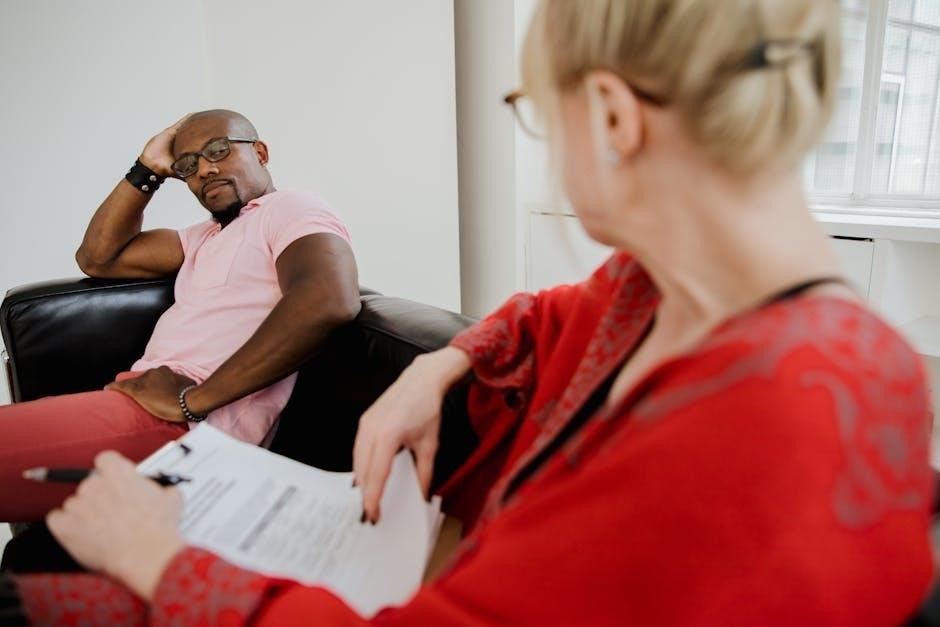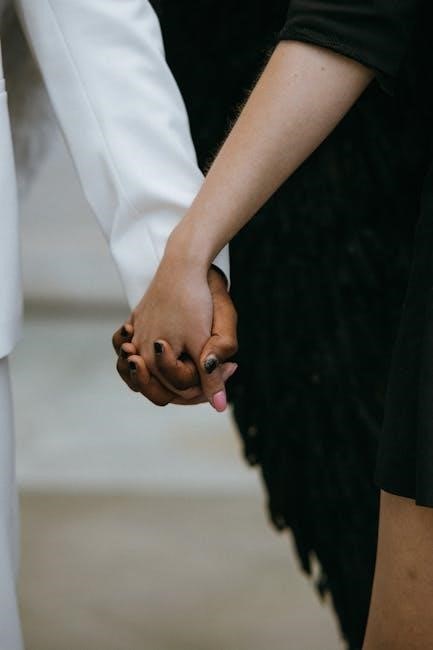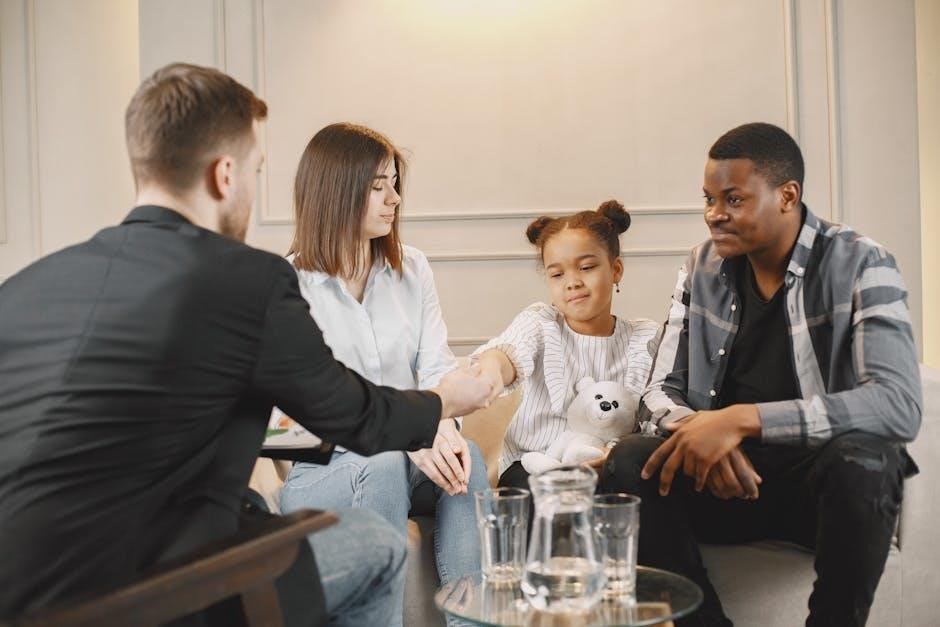Historical Context and Its Impact on Relationships
The legacy of slavery and systemic oppression deeply influenced Black relationships, fostering mistrust and communication barriers. Historical trauma reshaped dynamics, impacting intimacy, trust, and mutual understanding between Black men and women, as highlighted in Shahrazad Ali’s works, which emphasize the need for healing and empowerment to rebuild connections.
The Legacy of Slavery and Systemic Oppression
The transatlantic slave trade and centuries of systemic oppression created deep-seated emotional and societal fractures within Black communities. These systems enforced power imbalances, fostering mistrust and communication barriers between Black men and women. Shahrazad Ali’s works highlight how these historical wounds manifest in modern relationships, emphasizing the need for understanding and healing. The legacy of slavery continues to influence dynamics, with intergenerational trauma affecting intimacy and collaboration. Addressing these roots is essential for rebuilding trust and fostering mutual empowerment in Black relationships today.
Communication Strategies for Understanding
Active listening, empathy, and open dialogue are crucial for bridging understanding gaps. Shahrazad Ali’s guide emphasizes the importance of cultural nuances and honest communication to foster mutual respect and connection.
Verbal and Non-Verbal Cues in Interactions
Understanding verbal and non-verbal cues is vital for effective communication. Shahrazad Ali’s guide highlights how tone, body language, and facial expressions convey emotions and intentions. Black men and women often navigate cultural nuances that shape interactions. Verbal cues, such as directness or sarcasm, can influence perceptions, while non-verbal signals like eye contact or posture reveal confidence or defensiveness. Recognizing these cues helps bridge misunderstandings and fosters deeper connections. By being attentive to both forms of communication, individuals can better interpret each other’s needs and emotions, promoting harmony in relationships;

Empowerment and Its Role in Modern Dynamics
Empowerment fosters confidence and self-awareness, enabling Black men and women to navigate relationships with mutual respect and understanding, promoting healthier, more balanced modern interactions and societal progress.
Navigating Challenges and Opportunities in Empowerment
Empowerment within Black relationships requires addressing systemic barriers while fostering mutual respect and understanding. Challenges include dismantling stereotypes and fostering open communication, while opportunities arise from shared growth and unity. Shahrazad Ali’s works emphasize the importance of self-awareness and collective progress, encouraging Black men and women to support each other’s journeys. By embracing empowerment, both individuals can overcome historical traumas and build stronger, more equitable relationships, paving the way for a brighter, more unified future.
Mental Health Considerations
Historical and systemic factors significantly impact mental health, necessitating open dialogue and resilience. Understanding these challenges fosters healing and strengthens relationships, promoting emotional well-being for both partners.
Systemic Factors and Resilience in Mental Well-being
Systemic oppression and historical trauma have profoundly impacted the mental health of Black individuals, creating barriers to emotional well-being. Resilience, however, plays a crucial role in navigating these challenges. Open communication and mutual understanding between Black men and women can foster healing and strengthen mental health. By addressing systemic factors and embracing resilience, individuals can work towards a healthier, more supportive relationship dynamic, ultimately enhancing their overall well-being and fostering a stronger sense of community and unity.

Cultural Differences in Relationships
Cultural nuances and societal expectations often shape interactions between Black men and women, influencing communication styles and mutual understanding. Education and empathy are key to bridging these gaps;
Navigating Dating Challenges and Societal Expectations
Dating challenges for Black men and women often stem from societal stereotypes and cultural expectations. Books like The Blackman’s Guide to Understanding the Blackwoman highlight these issues, emphasizing the need for mutual respect and open communication. Navigating these challenges requires a deep understanding of each other’s experiences and perspectives. By addressing these dynamics, couples can build stronger, more resilient relationships that thrive despite external pressures. Education and empathy are essential tools in overcoming these obstacles and fostering meaningful connections.

Gender Roles and Expectations
Traditional gender roles in Black relationships often stem from historical and cultural norms, emphasizing male leadership and female nurturing. Modern shifts advocate for mutual respect and equality.
Traditional Roles and Modern Shifts in Gender Dynamics
Traditional gender roles often placed Black men as providers and protectors, while Black women were expected to nurture and support. These roles were deeply rooted in cultural and historical contexts, with societal expectations reinforcing these dynamics. However, modern shifts have challenged these norms, promoting mutual respect, equality, and shared responsibilities. Books like Shahrazad Ali’s “The Blackman’s Guide to Understanding the Blackwoman” highlight the importance of understanding and adapting to these changes for healthier relationships. Both partners are now encouraged to embrace fluid roles, fostering emotional and financial partnerships that reflect contemporary values and empower both individuals.
Socioeconomic Factors and Their Influence
Socioeconomic disparities significantly impact Black relationships, as financial instability and limited access to resources create stress. Addressing these challenges requires open communication and collaborative efforts to build stability and mutual support, fostering healthier relationship dynamics and shared goals.
Impact on Relationships and Community Solutions
Socioeconomic challenges, such as financial instability and limited access to resources, strain Black relationships, fostering tension and competition. Community initiatives, like educational programs and financial literacy, can empower individuals, while fostering collaboration and mutual support. Encouraging open dialogue and shared goals helps mitigate economic pressures, promoting healthier dynamics. Strengthening community bonds and providing accessible solutions are vital for building resilience and unity, enabling Black men and women to navigate challenges collectively and thrive together.
Intergenerational Trauma
Centuries of slavery and systemic oppression left deep emotional scars, passed through generations, affecting trust and intimacy in Black relationships. Healing requires acknowledging and addressing these historical wounds to fostering healthier connections and understanding.
Understanding Its Effects and Healing Processes
Intergenerational trauma, rooted in slavery and systemic oppression, manifests as mistrust and communication barriers in Black relationships. Healing requires open dialogue, empathy, and acknowledging the emotional toll of historical pain. Educational resources, like Shahrazad Ali’s works, highlight the need for mutual understanding and unity. Addressing these wounds fosters healthier connections, enabling Black men and women to break cycles of dysfunction and build stronger, more supportive partnerships. Through self-reflection and collective effort, healing becomes a pathway to liberation and empowerment for both individuals and the community.
Global Perspectives on Black Relationships
Black relationships across the diaspora share common challenges like historical trauma and systemic oppression. Global unity efforts focus on fostering understanding, healing, and empowerment for collective liberation and strength.
Experiences Across the Diaspora and Unity Efforts
Black relationships vary widely across the diaspora, shaped by unique cultural, historical, and societal contexts. From Africa to the Caribbean, Europe, and the Americas, shared experiences of resilience and struggle unite Black communities. Shahrazad Ali’s works highlight the need for cross-cultural understanding and collaboration to address common challenges like systemic oppression and historical trauma. Unity efforts emphasize open dialogue, mutual respect, and collective empowerment, fostering stronger, more supportive relationships globally. These initiatives aim to bridge gaps and promote healing, ensuring a unified and thriving Black community worldwide.

Personal Growth and Development
Self-reflection and educational pursuits are vital for fostering understanding and empowerment in Black relationships. Shahrazad Ali’s guide encourages personal growth through introspection and mutual respect, promoting healthier dynamics and unity.
Self-Reflection and Educational Pursuits for Better Understanding
Self-reflection and education are key to fostering understanding in Black relationships. Shahrazad Ali’s guide emphasizes introspection and learning, encouraging individuals to explore historical and cultural contexts that shape their interactions. By gaining insight into each other’s perspectives, Black men and women can build stronger, more empathetic connections. This approach promotes mutual respect and challenges stereotypes, creating a foundation for healthier, more empowered relationships within the community. Educational pursuits also provide tools for addressing systemic issues and fostering unity, as highlighted in the guide.
